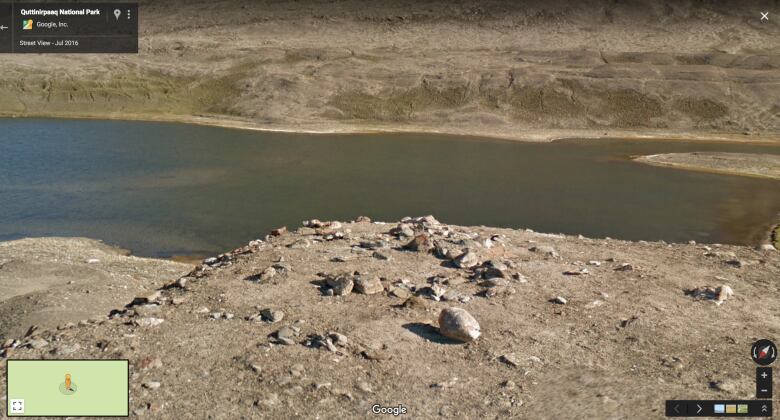Rare views of unique Nunavut park come to Google Street View
Only 50 people a year visit Quttinirpaaq National Park's remote glaciers, mountains and shorelines

You'll probably never visit Canada's Quttinirpaaq National Park in real life, but you can now take some virtual hikes through its massive glaciers, unusual flat-topped mountains and 4,500-year-old archeological sites.
Today, the remote High Arctic park, located at a latitude of 81.4672 degrees north — just 800 kilometres south of the north pole — becomes the northernmost place you can virtually visit on Google Street View. It's the latest of Canada's national parks and historic sites to be added to the service since 2013.

Emma Upton, manager of Quttinirpaaq National Park, and a colleague lugged Google's top-heavy 23-kilogram Trekker backpack camera across 30 kilometres of the park's terrain in five days to gather the Street View footage. They hope it will give more people a sense of a place that fewer than 50 people visit each year.
Highlights include a visit to the massive Air Force Glacier, which is about 30 metres high or about as tall as an eight-storey building.

"You're getting intimate with a massive glacial ice cap, you're on the edge of the glacier, the geology is phenomenal, and it just gives you a sense of the expanse of the park," Upton told CBC News. That's more than what you can get from photos, she added.
"The footage gives you a sense of being in the place and I think that's an incredible opportunity for people to experience because it is a place that is hard to get to."
Getting there physically means taking a commercial flight to Resolute, Nunavut followed by a four-hour charter flight on a Twin Otter aircraft. Altogether, you can expect it take at least a couple of days each way and cost well over $10,000.
Of course, Upton notes, there are things that aren't captured in the Street View images — the cracking and rumbling of the moving glacier, for instance. And the unique experience of hiking for a couple weeks without seeing any signs of human life — just muskox and Arctic hares, wolves and foxes.

"You're not going to see jets flying over you, you're not going to meet anybody else, you'll hardly see any other human footprints," she said. "That sense of solitude I think is hard to find these days and that is something we can pretty much guarantee."
If the images make you want to experience that, Upton notes that Parks Canada offers charter flights from Resolute to Quttinirpaaq National Park once a year for $7,500 a seat.
With files from Nick Murray
